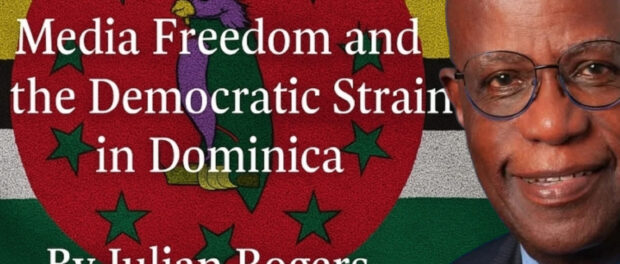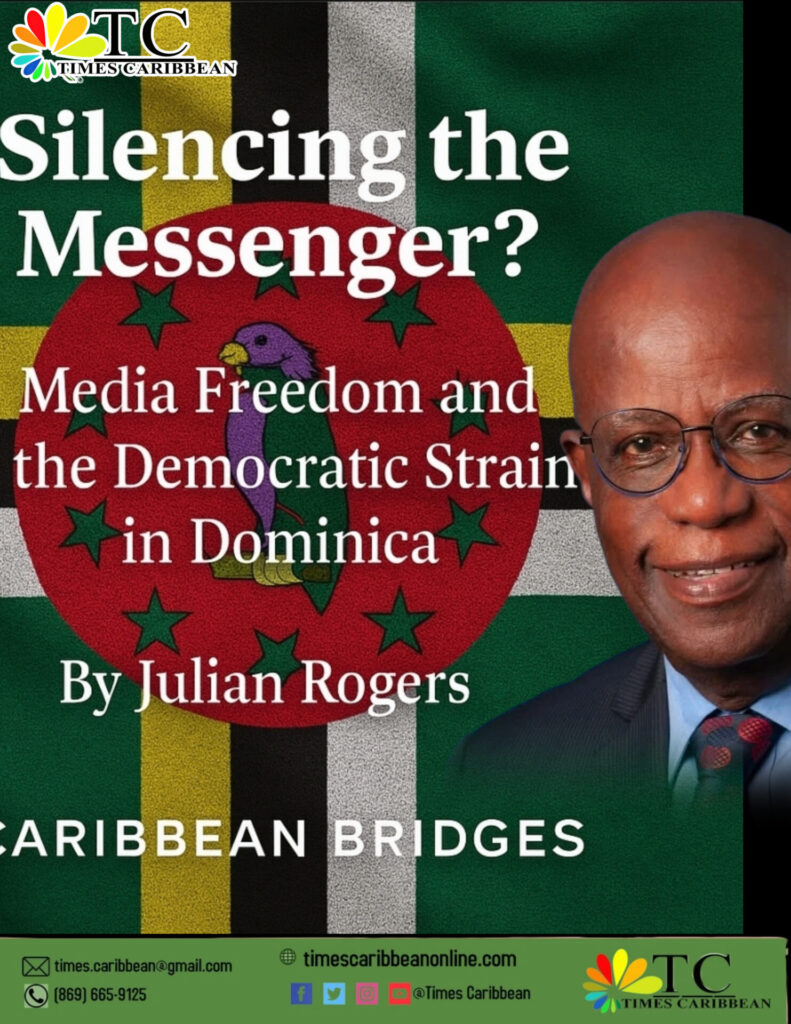SILENCING THE MESSENGER ? Media Freedom and the Democratic Strain in Dominica

by Julian Rogers,
In an era where ballot counts and development projects often serve as indicators of the promise of Caribbean democracy, the more profound indicators—such as freedom of the press—are quietly under siege. Nowhere is this more evident than in Dominica, where concerns about the erosion of media freedom have been escalating for years. A recent impromptu online discussion, organised by the Electoral Reform Coalition (ERC), brought together journalists, civil society leaders, and regional media figures to confront the issues head-on.
I participated in that conversation alongside seasoned Dominican journalists, civil rights advocates, and media veterans. What emerged was a deeply felt concern not just for Dominica but for the state of journalism and democracy across the region.
Journalism on Trial
The ERC’s invitation to regional media practitioners made clear their dual concern: not only with Dominica’s flawed electoral process, but also with the deepening threat to press freedom. They highlighted the shocking incident on March 19th, when police commander Jeffrey James allegedly assaulted a young EmoNews reporter covering the protest. According to the ERC, state media representatives from DBS Radio, who were in close proximity, remained silent while their independent colleague was attacked.
“EmoNews is one of the few media houses in the Commonwealth of Dominica which objectively covers the activities of both government and opposition,” the ERC stated in its invitation. The episode laid bare the vulnerability of independent journalism in an increasingly polarised environment.
As Kathy Andre declared in the opening minutes of the session, “The press in Dominica was on trial during the March 19th protests.” She urged her fellow journalists to stop accepting infringements as routine and start using the law to defend their rights. “We cannot keep taking this lying down,” she said. “We have to value our freedom and integrity enough to act.” This call was not only courageous but necessary. Many journalists in Dominica feel trapped between their professional obligations and the risks of state retaliation—economic, legal, or otherwise.
Media as Monologue, Not Dialogue One of the gravest concerns expressed during the session was the government’s retreat from meaningful engagement with the press. There are no regular press conferences. No structured opportunities to question public officials. As Andre put it bluntly, communication from the government has become “a monologue, not a dialogue.”
This is a critical shift. In a democracy, the media is the conduit between the government and the governed. Without that bridge, the public is left in the dark, vulnerable to misinformation and manipulation.
A Veteran Perspective As I noted during the session, the regional community cannot remain silent: “We should not have to plead for media freedom—it is not a favour. It is a democratic right.”
Drawing on Dominica’s history—rife with struggles for civil rights and democratic order—I clarified that my recent commentary was not an indictment, but a reflection on the need to preserve the gains so hard-won. We’ve been here before. We must not go back.
And yet, as I added later in the session, “The situation in Dominica reflects a lack of progress from its troubled past.” If we fail to support our colleagues, we tacitly allow the erosion of freedoms across the region.
Inform, Don’t Silence Anthony Drigo, journalist and educator, was resolute about the essential role of journalists: “If you silence the media, you silence the people. Journalism informs the public, and that’s what democracy depends on.”
He underscored how the very structure of Caribbean media—where the government is often the primary advertiser—creates a dangerous dependency that can suffocate criticism.
Drigo offered a forward-looking solution: reintroduce school newspapers and debate competitions to “empower the next generation with the skills and responsibility to uphold democratic ideals.”
Solidarity Is Not Optional As the discussion closed, Johnson Boston, chairman of the Electoral Reform Coalition, joined Kathy Andre in reminding us of the broader stakes: campaign finance transparency, a corrupted voter list, and the freedom to protest peacefully—these are not niche issues. They’re pillars of the democratic house.
“We must not let the rights of journalists—and citizens—to question power be casually erased.” — Johnson Boston.
In addition to convening the media freedom discussion, the Electoral Reform Coalition (ERC) has also condemned what it calls the “indiscriminate arrests of innocent Dominican citizens” protesting the electoral bills passed on March 19th.
In a strongly worded statement, the ERC criticised both the government and the parliamentary opposition for failing to share the final versions of the bills with the public and for ignoring calls for comprehensive reform, including complete voter registration and the implementation of campaign finance laws.
“The Commonwealth of Dominica must be liberated from the influence of dirty money in our general election,” the release stated, warning that without these changes, Dominica’s democracy remains vulnerable to manipulation. The ERC also confirmed that access to public broadcasting was denied and that protesters were physically blocked from approaching Parliament. “The struggle continues,” they concluded. “Victory is certain.”
The Road Ahead The protection of media freedom in Dominica requires urgent action:
- Institutional support for journalists
- Legal frameworks that protect against intimidation
- Clear, consistent access to government information
- Economic independence for media houses
- Regional organisations that don’t flinch in the face of political pressure
Most of all, it requires public awareness. The public must understand that a free press isn’t for the benefit of journalists—it’s for the benefit of the people.
Dominica’s struggle is a Caribbean struggle. If one voice is silenced, all others are at risk.
Final Thought We cannot allow the silencing of the press to become the silent death of democracy. The message from the Dominican media community is clear: “We are not the enemy. We are the mirror. Let us reflect the truth.”

Leave a comment
You must be logged in to post a comment.